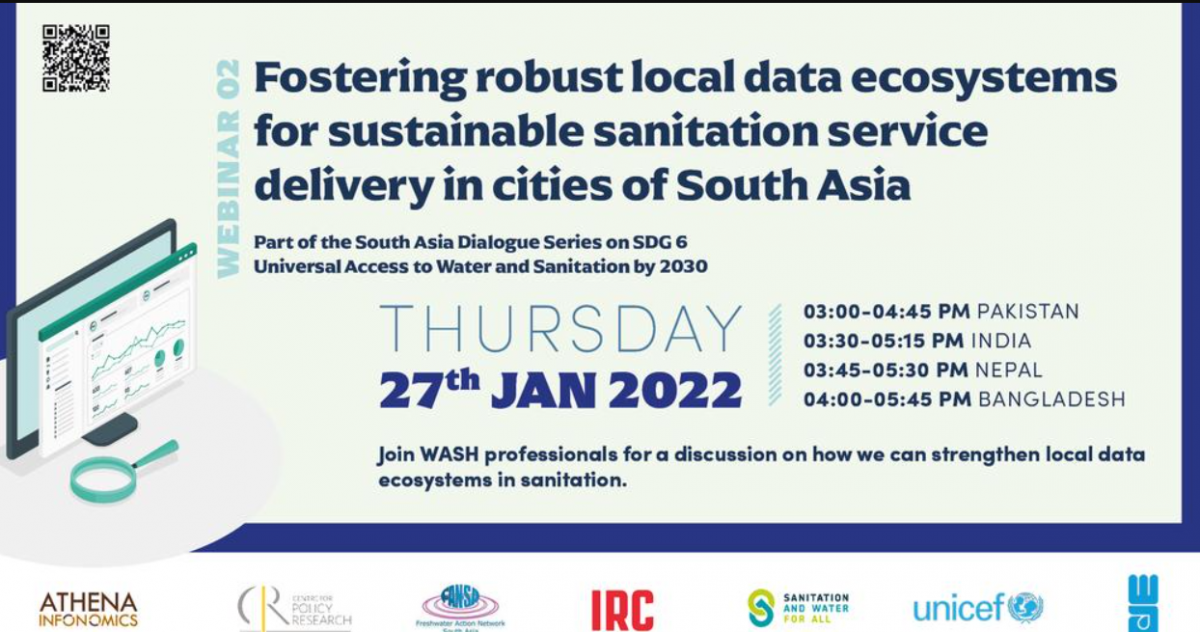WASH professionals joined a discussion on how to strengthen local data ecosystems in sanitation.
Published on: 26/01/2022

This is the second webinar of the South Asia Dialogue Series on Sustainable Development Goal 6. This series - a joint initiative by Athena Infonomics, the Centre for Policy Research (CPR), Freshwater Action Network South Asia (FANSA), IRC WASH, Sanitation and Water for All (SWA), UNICEF, and WaterAid - aimed to encourage cross-learning throughout South Asia in order to unlock specific barriers hampering the progress of SDG 6 in the region.
Date: 26 January 2022
Time: 13:00-14:45 CET | 15:00-16:45 Pakistan | 15:30-17:15 India | 15:45-17:30 Nepal | 16:00-17:45 Bangladesh
The session was also be live-streamed on the CPR Facebook page.
National, sub-national, and local governments across South Asia are striving to deliver safely managed sanitation services to their citizens by 2030. To meet the goal, each tier must respond to questions that are unique to its specific set of roles and responsibilities in planning, policy, implementation, operations, and monitoring. As a result, each tier of government confronts the requirement of particular data-led evidence for accomplishing the objectives it is accountable for. Datasets at the global, regional, and national levels, e.g., the WHO-UNICEF Joint Monitoring Program, population censuses, national sample surveys, describe the levels of access to services for decision-making at its broadest. Program- and project-specific Management Information Systems help individual agencies and partners track implementation and outputs. On the other hand, the delivery of safe, reliable, and timely services depends on robust data ecosystems that help local governments continuously monitor, diagnose, and improve the performance of the underlying service delivery systems.
Many cities and states across South Asia have pioneered such local data ecosystems over the last few years. Examples include the Integrated Municipal Information System in Jhenaidah municipality in Bangladesh and the Faecal Sludge Management Platform in multiple cities in the state of Odisha, India. As more cities in the region begin to develop and commission city-level service delivery systems for improved sanitation and as existing data ecosystems mature, it is critical to learn:
The present webinar brought together partners from government, non-profits, and developmental agencies to deliberate on these questions. It will seek to identify insights for how we can strengthen local data ecosystems for sanitation to bring about the 'data empowerment' of both local governments and citizens towards collaboration for improved service delivery.
(all times in IST)
15:30-15:40 - Introduction to the Series and Setting the Context - Centre for Policy Research
15.40-16.10 - Imperatives and Challenges for Local Data Ecosystems: Learning from Practice - Athena Infonomics, SNV (Bangladesh), Centre for Policy Research
16:10-16:25 - Moderated Q/A
16:15-17:10 - Unlocking Accountability, Transparency and Scale of Local Data Ecosystems: Panel Discussion and Moderated Q/A - Moderated by Peter Harvey, Regional Advisor WASH, UNICEF Regional Office for South Asia
Discussants:
17.10-17.15 - Closing Remarks - Athena Infonomics
View the video recording of the webinar below and read a summary of the key takeaways from this and the other webinars here.